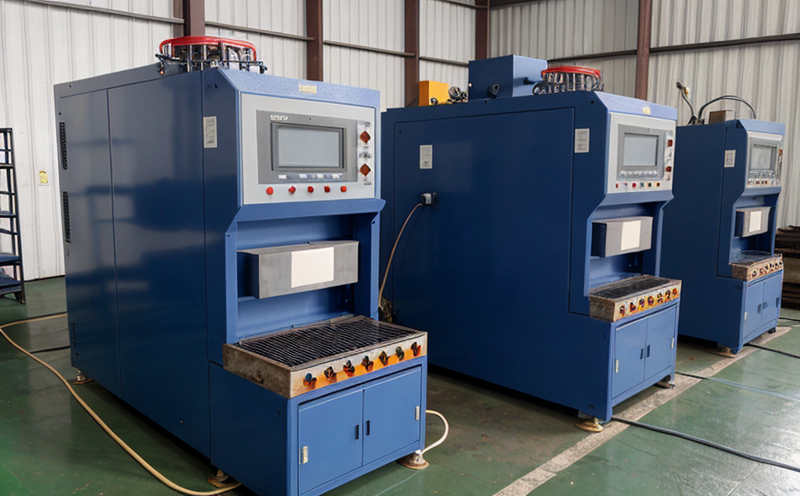JIS K0068 Resin Moisture Testing
The JIS K0068 standard, a critical component of Japanese Industrial Standards (JIS), provides comprehensive guidelines for determining the moisture content in synthetic resins. This service is particularly important for ensuring that raw materials meet stringent quality control thresholds, which are essential for industrial manufacturing processes.
Resin moisture testing plays a pivotal role in maintaining product consistency and reliability across various industries such as plastics, electronics, and construction. The moisture content of resins significantly affects their processing behavior and the final properties of products formed from these materials. For instance, excessive moisture can lead to processing issues like poor flowability during extrusion or injection molding, affecting both efficiency and quality.
The testing procedure outlined in JIS K0068 involves drying samples under controlled conditions until a constant weight is achieved, which indicates that no further loss of water occurs. This method ensures accurate measurement of moisture content by eliminating other variables such as surface moisture or adsorbed water. The test apparatus typically includes an oven capable of precise temperature control and an analytical balance for weighing the dry and wet samples.
The standard specifies a range of acceptable moisture levels depending on the type of resin being tested, reflecting its unique physical properties and intended application. For example, some resins have lower tolerance to moisture due to their chemical composition or processing requirements. Understanding these nuances helps ensure that materials are processed optimally, thereby minimizing waste and enhancing productivity.
The importance of JIS K0068 resin moisture testing extends beyond just compliance with industry standards; it also supports innovation within R&D departments by providing reliable data points for material development. By closely monitoring moisture content during research stages, manufacturers can identify optimal processing parameters early in the product lifecycle, leading to improved performance and reduced costs.
Furthermore, accurate moisture measurement is crucial for procurement teams when selecting suppliers or raw materials. Ensuring that incoming batches meet specified limits helps prevent costly rejections downstream in production lines. This proactive approach not only saves time but also maintains consistent supply chains essential for meeting customer demands promptly.
| Resin Type | Acceptable Moisture Range (%) |
|---|---|
| Polyethylene Terephthalate (PET) | <0.25% |
| Polycarbonate (PC) | <0.1% |
| Nylon 6,6 | <0.4% |
The table above provides an overview of acceptable moisture ranges for different synthetic resins based on JIS K0068 requirements. These values serve as benchmarks against which incoming materials are evaluated during quality assurance processes.
In summary, JIS K0068 resin moisture testing offers a robust framework for ensuring consistent raw material quality across industrial manufacturing processes. By adhering to this standard, organizations can enhance product performance, optimize production efficiency, and maintain compliance with international regulations.
Benefits
- Ensures consistent raw material quality by accurately measuring moisture content.
- Promotes efficient processing through optimal drying of resins before use in manufacturing processes.
- Reduces waste and enhances productivity by identifying suitable processing parameters early in the development stage.
- Supports innovation within R&D teams by providing reliable data points for material improvement projects.
- Aids in selecting appropriate suppliers or raw materials based on specified moisture limits, ensuring consistent supply chains.
- Maintains compliance with international standards and industry best practices.
Customer Impact and Satisfaction
Customers benefit significantly from the high quality of materials provided by suppliers who adhere to JIS K0068 resin moisture testing protocols. Consistently meeting or exceeding specified moisture content ensures that products have predictable performance characteristics, leading to enhanced customer satisfaction.
Satisfied customers are more likely to recommend reliable suppliers and maintain long-term relationships based on trust and reliability. This positive feedback loop fosters a competitive advantage for manufacturers who invest in robust quality assurance systems like those offered by our laboratory services.
Moreover, satisfying regulatory requirements through rigorous testing practices demonstrates commitment to excellence, which builds brand reputation among industry peers and end-users alike.
Use Cases and Application Examples
- Polyethylene Terephthalate (PET): Ensuring that PET bottles have minimal moisture content to maintain clarity and prevent mold growth.
- Polycarbonate (PC): Guaranteeing that PC sheets used in electronics are dry enough to avoid short-circuit risks during assembly.
- Nylon 6,6: Controlling the moisture level of nylon threads for textile manufacturing to ensure durability and resistance against degradation.
- Polypropylene (PP): Monitoring PP granules' moisture content to maintain proper flowability in extrusion processes without causing blockages or jams.
The table below highlights specific use cases where JIS K0068 resin moisture testing is particularly relevant:
| Resin Type | Use Case |
|---|---|
| Polyethylene Terephthalate (PET) | Bottle manufacturing for clear, mold-resistant products. |
| Polycarbonate (PC) | Electronics component production to avoid short-circuit risks. |
| Nylon 6,6 | Texile manufacturing ensuring durability and resistance against degradation. |
| Polypropylene (PP) | Extrusion processes maintaining proper flowability without blockages or jams. |
These examples illustrate how JIS K0068 resin moisture testing contributes to various aspects of industrial manufacturing, from packaging to electronics and textiles. By adhering to this standard, manufacturers can achieve higher levels of product quality and customer satisfaction across diverse applications.





